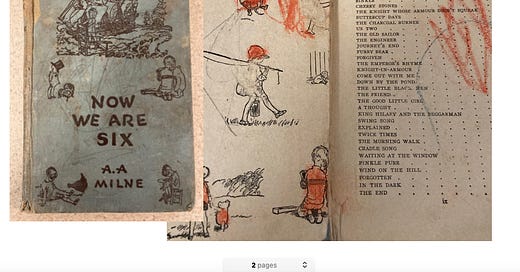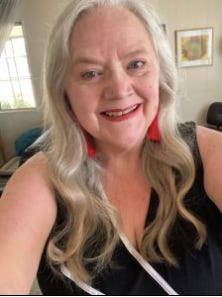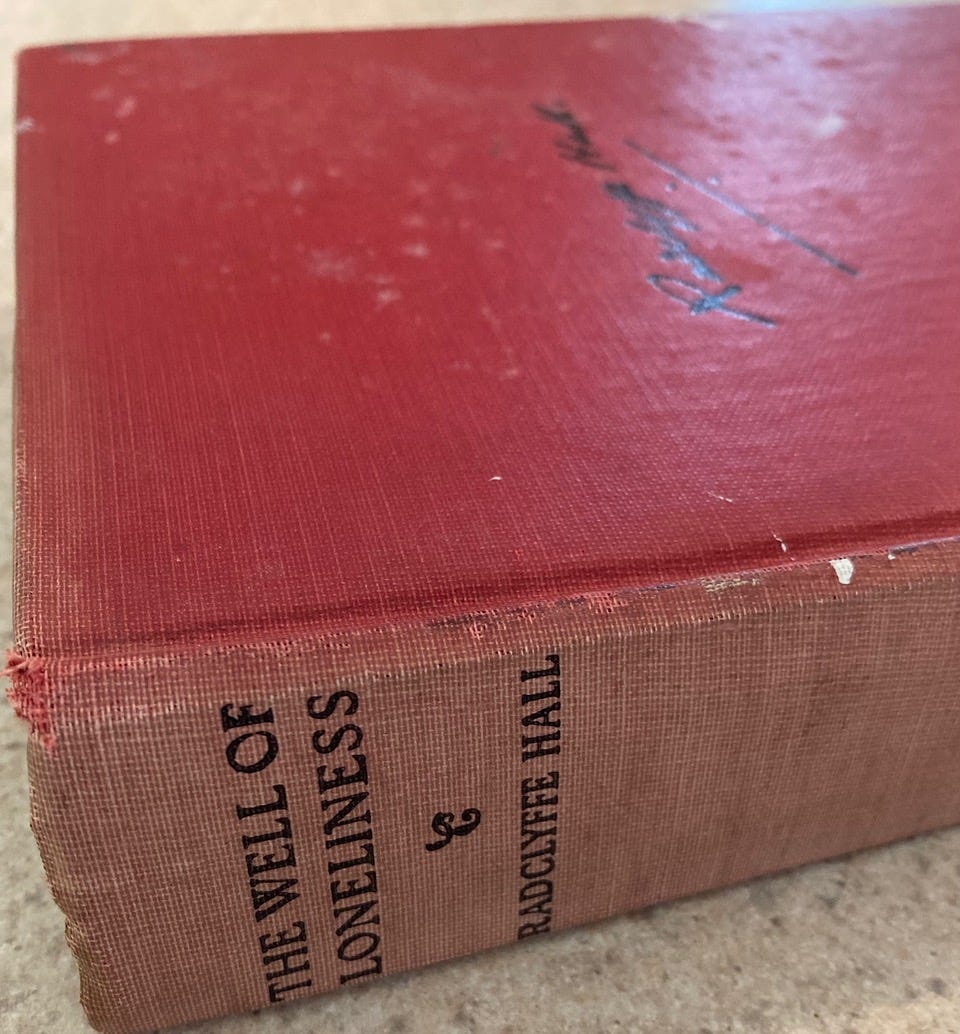The Books That Made Her
A Spark reader talks about the books that influenced her as a writer and in her life
Before we begin
If you are a writer, what are the books and authors who have influenced you and your work? If you are a reader, which books and authors have influenced you in ways you may not have predicted? Are there any books or authors you’ve read that are guiding you now, through this period of your working or personal life?
Welcome! You’ve reached Spark. Learn more here or just read on. If you received this from a friend, please join us by subscribing. It’s free! All you have to do is press the button below. If you have already subscribed, welcome back! BTW, If this email looks truncated in your inbox, just click through now so you can read it all in one go.
Glad I Asked
Every week I encourage you all to send in ideas or questions that you’d like to explore when we connect on Saturday mornings (or whenever you open your issue of Spark). Not long ago, Sandra de Helen did just that. Why, she asked, don’t we talk about the books that influenced us? Great idea. Then it occurred to me that Sandra is a writer and so I asked her if she wanted to take a shot. I’m so glad she said yes and I think you will be too. She got me thinking not just about the books I encountered early in my life but throughout. I found myself wondering what I would carry with me into the future from the books I am reading now.
What about you?
A bit about Sandra: she has been reading Spark since its inception ( you might recognize her name from a recent Moment of Zen which featured a still moment in her sewing room leading up to her granddaughter’s wedding). A playwright, poet, and novelist, her work has been performed and published all over the country. You can read more about her here at Poets & Writers where you can also listen to her read selected poems, and here at Launch Point Press, her publisher.
Here’s what Sandra looks like:
And here’s her essay. I’ll get out of the way now and join you in the discussion.
The Books I Read in Childhood Influenced My Writing
By Sandra de Helen
Now We Are Six may not be A. A. Milne's first book, but it was mine. My dad taught me to read from this book when I was four years old. I sat on his lap, my finger under each word as I asked, "What's this word, Dad?" Soon I had learned every word and was able to read the book (and other books) to myself -- a habit I continue daily.
Our house contained one bookshelf. It was part of an old secretary desk that a judge had given my dad's mother, who cleaned house for him after her husband died, leaving her with four kids to feed. My own dad followed in his father's footsteps and dropped dead of a heart attack when he was forty-two, leaving my mom to raise me (age seven) and my sister (not quite two). He gave me the gift of reading, and I read every book on our shelf, including this one:
The books influenced my writing, which I started when I was eight. We had a plethora of Zane Grey novels (Dad's favorite), but also The Complete Sherlock Holmes, one volume of the encyclopedia, a book called Reading is FUNdamental, one entitled Mathematics Made Easy, and a book on etiquette filled with line drawings of which side the man should walk on, when and how to shake hands -- with or without gloves. I'd be lying if I said I wasn't also influenced by that book, though perhaps not in my writing. Another huge influence on my life was The Well of Loneliness by Radclyffe Hall. I read it at age ten. It didn't turn me into a lesbian, but it gave me a glimpse into the life. The book was sad, as it was of its time, but my mom had a friend who was single and butch, and after I read the book, I felt I understood her. When I came out myself, I was happy to find there were books about lesbians with happy endings.
We moved into town when I was eleven and I had access to a public library and The Secret Garden by Frances Hodgson Burnett, as well as the Nancy Drew books written by a syndicate beginning with Carolyn Keene. I wasn't allowed to check out "adult" books at the public library, so I filled up on what was available to me.
I won my first writing prize at age twelve. I was paid three dollars and allowed to read my essay aloud to the audience at the American Legion. At fourteen, my English teacher submitted my poem about abortion to a national teacher's magazine. It was published and she showed it to me. I had no idea she had sent it in, but I was proud to be a published poet.
One of my first produced plays was a musical about Nancy Drew and her pals. It ran for six months in Chicago. My collaborator and I used the style of language from the books, but it was not a version of any particular story. Rather, we called it an affectionate satire.
My first published novel was The Hounding, my version of the Sherlock Holmes story, featuring a female Sherlock and Dr. Watson. I'm at work on the third book in that series now. Doyle’ stories not only influenced my writing, but my behavior as a youngster. I fancied myself a detective, carrying around a magnifying glass and pipe as I solved the household mysteries such as missing items and who ate the last piece of cornbread. The Complete Sherlock Holmes by A. Conan Doyle as well as Mathematics Made Easy by Henry Thomas helped form my ability to think deeply and logically. Nancy Drew no doubt played a part as well in creating my lifelong love of mystery novels.
Today I write plays, novels, and lots and lots of poetry. Without having learned to read, without having read so widely, I may not have become a writer. I write and read every single day of my life, and am grateful for the ability to do so. Here’s a look at my current lineup:
Books I’m reading now: You Should Have Known by Jean Hanff Korelitz.
Next up: Horse by Geraldine Brooks, and At the Bottom of the River by Jamaica Kincaid.
Regular reading: In addition to Spark, I read
by Roxane Gay, by Heather Cox Richardson, by Jami Attenberg, and the Substack by. In addition to books and newsletters, I also read poetry every day, the New York Times, and The New Yorker magazine.Links!
The Books That Made Me: 8 Writers on their literary inspirations (New York Times, 2021)
Books That Changed My Life - A list of books named by readers, not writers
The Book Stack that Influenced one Writer
Three of the books that influenced Sandra DeHelen are still on her bookshelf, complete with well-worn binders and crayon marks on the pages. Do you have any old books you’ve kept for years?
Spark is Yours: Chime In
Have you just finished a book you loved? Tell us about it. Got a great resource for readers or writers? Share away! How about sharing your book stack with us, that tower of tomes rising next to your bed or your bath or wherever you keep the books you intend to read – someday. And if you stumbled on a Moment of Zen, show us what moved you, made you laugh, or just created a sliver of light in an otherwise murky world. And if you’ve got an idea for a theme or want to write for us, just let me know at elizabethmarro@substack.com.
Thank you and Welcome
Thank you to everyone who shared Spark with a friend again this week. Welcome to all new subscribers! Thank you so much for being here. If you would like to check out past issues, here’s a quick link to the archives. Be sure to check out our Resources for Readers and Writers too.
That’s it for this week. Let me know how you are and what you’re thinking about. And of course, always let me know what you’re reading. If there’s an idea, book, or question you’d like to see in an upcoming issue of Spark, let us know!
Remember, If you like what you see or it resonates with you, please share Spark with a friend and take a minute to click the heart ❤️ below - it helps more folks to find us!
Ciao for now!
Gratefully,
Betsy
P.S. And now, your moment of Zen…Katie and her ball

Calling for Your Contribution to “Moment of Zen”
What is YOUR moment of Zen? Send me your photos, a video, a drawing, a song, a poem, or anything with a visual that moved you, thrilled you, calmed you. Or just cracked you up. This feature is wide open for your own personal interpretation.
Come on, go through your photos, your memories or just keep your eyes and ears to the ground and then share. Send your photos/links, etc. to me by replying to this email or simply by sending to: elizabethmarro@substack.com. The main guidelines are probably already obvious: don’t hurt anyone -- don’t send anything that violates the privacy of someone you love or even someone you hate, don’t send anything divisive, or aimed at disparaging others. Our Zen moments are to help us connect, to bond, to learn, to wonder, to share -- to escape the world for a little bit and return refreshed.
And remember,If you like what you see or it resonates with you, please share Spark with a friend and take a minute to click the heart ❤️ below - it helps more folks to find us!










I don't have a copy of it but I hold a special place in my heart for "Teaching Johnny To Read," the book my dad used to teach me to read when I was four. I can remember the large rectangular cover, a blue/green background, the shiny surface that gradually gave way as I, then my brother, and others used it.
I have distinct memories of reading the Nancy Drew books, the Trixie Belden books, The Hardy Boys books, just about any book in which a kid had some agency to solve problems drew my attention. Later, as a teenager I discovered a 1936 copy "Gone With the Wind" which I discovered in our old house after we moved into it. I still have this copy. Years and many readings later, I see the story and the motivation for its existence very differently than I did when I first fell into it. I can still recall, however, how confused and thrilled I was when I encountered Scarlett O'Hara who was hard-headed, heartless, and resilient - not the typical romantic heroine I remember from other stories I read at the time. As a teenager, I was trying to figure out how women's power worked in the world: was it sex, was it money, was it intelligence? What, I wanted to know then, was a strong woman? Was it possible for a woman to need no one but herself to be successful? Why did that always mean giving up something -- usually love?
Oddly, it is the books I read to my son when he was an infant that I retain today. "The Jungle Book," "Where The Sidewalk Ends," and yes, "Winnie The Pooh" and all its sequels. I remember him at six months old settled in his father's lap and falling asleep to The Lord of the Rings, Louis L'Amour, and Conan the Barbarian. These I do not retain but it taught me that the content matters no where near as much as absorbing stories through the skin along with the beating heart, regular breaths, and familiar voice of a loving person.
The first book that influenced my thinking was “Thidwick, the Big-Hearted Moose,” by Dr. Seuss, which my parents read to me when I was four. It draws a clear line between generosity (which is good) and not being able to say no (not so good.) As an adult I was changed by Josef Skvorecky’s autobiographical novel “The Engineer of Human Souls.” After reading Skvorecky, who spent his formative years in Czechoslovakia under first the Nazis, then the Communists, before emigrating to Canada, I swore off all ideologies, all -isms, in favor of thinking through each issue on its own merits.
As for my writing, well, writers, like painters, musicians, and other artists and craftspeople, learn by imitating those they admire. During my teens and twenties, writing for newspapers and magazines, my role models included Kurt Vonnegut, Bernard Malamud, Hemingway, Nora Ephron, Joan Didion, and Annie Dillard; later in life, when I turned to poetry, my influences included Raymond Carver, Sharon Olds, Mary Oliver, Billy Collins, Mark Strand, Anne Carson, and Charles Simic. Whether as a journalist, essayist, or poet, I try to keep in mind two maxims: 1) There is no place for wasted words, and 2) there is always room for humor. As Stephen King put it, “The road to Hell is paved with adverbs.”